|
|
|
Sort Order |
|
|
|
Items / Page
|
|
|
|
|
|
|
| Srl | Item |
| 1 |
ID:
157898
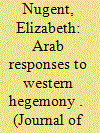

|
|
|
|
|
| Summary/Abstract |
Scholars have long held that Islamism—defined as a political ideology that demands the application of Islamic holy law and the deepening of religious identity—is in part a response to Western domination of Muslim lands. Drawing on the literatures on nationalism and international relations theory, we argue that Islamism is one of a menu of options that Muslims may adopt in response to Western hegemony—a menu that includes Arab nationalism and pro-Western accommodation. We hypothesize that a Muslim’s ideological response to Western domination is a function of the type of domination experienced—that is, military, cultural, or economic—as well as of individual-level characteristics such as intensity of religious practice. We test this hypothesis with a nationally representative survey experiment conducted in Egypt. We find that, among subjects in our study, pro-Western responses to Western domination were more common than “Islamist” or “nationalist” ones and that these were particularly driven by reminders of the West’s economic ascendancy. These findings suggest that foreign domination does not always yield defensive responses and often produces desires for greater cooperation with the hegemon.
|
|
|
|
|
|
|
|
|
|
|
|
|
|
|
|
| 2 |
ID:
143349


|
|
|
|
|
| Summary/Abstract |
Why do some individuals pick up arms as opposed to others who live under the same conditions? Environmental and group theories fail to differentiate between these individuals. In response, we apply the cognitive mapping approach and model violence as decisions based on chains of beliefs about various types of factors, including state aggression, access to violent groups, religion, and personal characteristics. Based on a double-paired comparison, data are constructed from ethnographic interviews with Muslim and non-Muslim individuals engaging in violent and nonviolent activity in authoritarian and democratic states—Egypt and Germany. The analysis develops a computational model formalizing the cognitive maps into Bayesian networks. In 477,604 runs, the model (1) identifies the beliefs connected to decisions, (2) traces inference chains antecedent to decisions, and (3) explores counterfactuals. This suggests that both violent and nonviolent activities are responses to state aggression, and not to Islam, group access, or personal characteristics.
|
|
|
|
|
|
|
|
|
|
|
|
|
|
|
|
| 3 |
ID:
149475
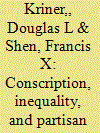

|
|
|
|
|
| Summary/Abstract |
While recent scholarship suggests that conscription decreases support for military action, we argue that its effect is contingent both on a draft’s consequences for inequality in military sacrifice and on partisanship. In an experiment examining public support for defending South Korea, we find that reinstating the draft significantly decreases support for war among Democrats; however, this effect is diminished if the draft reduces inequality in sacrifice. Support for war among Republicans, by contrast, responds neither to information about conscription nor its inequality ramifications. A follow-up experiment shows that conscription continues to significantly decrease support for war, even in the context of a retaliatory strike against a foreign state that targeted American forces. Moreover, partisanship and the inequality ramifications of the draft continue to moderate the relationships between conscription and public opinion. More broadly, our study emphasizes the importance of examining how Americans evaluate foreign policy–relevant information through partisan lenses.
|
|
|
|
|
|
|
|
|
|
|
|
|
|
|
|
| 4 |
ID:
159858
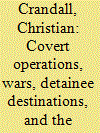

|
|
|
|
|
| Summary/Abstract |
We explore US covert forcible actions against democratic governments and their citizens and show that interdemocratic use of covert force is common and can be accommodated within the theory of democratic peace. Grounded in the Perceptual Theory of Legitimacy, we argue that democracies are constrained by public perceptions of their legitimacy from overtly aggressing against other democratic states. When democracies desire to aggress against their democratic counterparts, they will do so covertly. We test the assumptions of the theory and its implication with (1) laboratory studies of the conflation of democracy with ally status and (2) historical analyses of covert militarized actions and prisoner detention, which show that US forcible actions, when carried out against democracies and their citizens, are carried out clandestinely.
|
|
|
|
|
|
|
|
|
|
|
|
|
|
|
|
| 5 |
ID:
172326
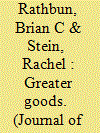

|
|
|
|
|
| Summary/Abstract |
Recent research into the public’s attitude toward the use of nuclear weapons repeats long-standing mistakes in how international relations theorists think about morality. Falsely equating consequentialism with state egoism and normative obligations with restrictions on the use of weapons of mass destruction implies that ethically motivated beliefs about foreign affairs must be other-regarding and that other-regarding behavior is not utilitarian in character. Drawing on empirical research into moral psychology, we argue that liberal, other-regarding morality is only one kind of ethical foundation. Alternative moral concerns such as retribution, deference to authority, and in-group loyalty also help to determine foreign policy beliefs. We find that all three are associated with support for the use of nuclear weapons in the American public. Our survey respondents act as moral utilitarians who weigh different ethical considerations in forming their judgments.
|
|
|
|
|
|
|
|
|
|
|
|
|
|
|
|
| 6 |
ID:
165260


|
|
|
|
|
| Summary/Abstract |
How can declining states reliably infer the intentions of rising states? One prominent line of argument maintains that because declining states face intractable uncertainty about rising states’ future intentions, preventive war is often unavoidable even between states with truly compatible goals. This article presents a dynamic model of reassurance in which actors are uncertain whether or not their interests conflict. The model shows that by adopting a hedging strategy of limited containment short of war, declining states can reduce risers’ incentives to send dishonest cooperative signals. This, in turn, makes cooperation more credible as a signal of risers’ benign intentions. Moreover, these signals are sufficiently informative to dissuade the decliner from escalating to preventive war even under large power shifts. Thus, although power shifts promote limited competition among states with compatible goals, preventive war rationally occurs only in a bargaining context when the riser’s goals are known to be incompatible.
|
|
|
|
|
|
|
|
|
|
|
|
|
|
|
|
| 7 |
ID:
077420
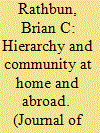

|
|
|
|
|
| Publication |
2007.
|
| Summary/Abstract |
Although there is increasing evidence of a relationship between domestic and foreign policy attitudes among American elites, we have less of an idea about why these sets of attitudes cohere. The answer lies in a better understanding of what we mean when we talk about "left" and "right" or "liberal" and "conservative." Drawing on the literature on rights theory, partisan cleavages, and ideological continua, I posit the existence of two core values, hierarchy and community, that should manifest themselves both at home and abroad. I perform a principal components analysis on data capturing both the domestic and foreign policy attitudes of American elites. The results indicate an almost identical structure of attitudes in both domains, indicating that it is generally inappropriate to distinguish between the two. Using factor scores in a series of logistic regressions, I demonstrate that support for community is most important for predicting support for humanitarian military operations, while hierarchy and community both help determine positions on strategic missions
|
|
|
|
|
|
|
|
|
|
|
|
|
|
|
|
| 8 |
ID:
173777


|
|
|
|
|
| Summary/Abstract |
Does religious behavior always promote hostility toward members of other faiths? This article suggests that the relationship between personal religious behavior and religious tolerance is not so simple. Even in the Arab World, frequently cited as a center of religious piety and intolerance, different forms of religious behavior have markedly different effects on attitudes toward minority sects. Using both observational and experimental data from across the Arab World as well as an original nationally representative survey conducted in Lebanon in 2013 and 2014, I argue that while communal religious practice does indeed tend to promote intolerant attitudes, personal prayer has precisely the opposite effect. These findings indicate that the traditional assumption that piety invariably leads to intolerance should be rethought. Even in one of the most sectarian environments in the world, private religious behavior can have a substantial pro-tolerance effect.
|
|
|
|
|
|
|
|
|
|
|
|
|
|
|
|
| 9 |
ID:
180672


|
|
|
|
|
| Summary/Abstract |
Reputations for resolve are said to be one of the few things worth fighting for, yet they remain inadequately understood. Discussions of reputation focus almost exclusively on first-order belief change—A stands firm, B updates its beliefs about A’s resolve. Such first-order reputational effects are important, but they are not the whole story. Higher-order beliefs—what A believes about B’s beliefs, and so on—matter a great deal as well. When A comes to believe that B is more resolved, this may decrease A’s resolve, and this in turn may increase B’s resolve, and so on. In other words, resolve is interdependent. We offer a framework for estimating higher-order effects, and find evidence of such reasoning in a survey experiment on quasi-elites. Our findings indicate both that states and leaders can develop potent reputations for resolve, and that higher-order beliefs are often responsible for a large proportion of these effects (40 percent to 70 percent in our experimental setting). We conclude by complementing the survey with qualitative evidence and laying the groundwork for future research.
|
|
|
|
|
|
|
|
|
|
|
|
|
|
|
|
| 10 |
ID:
178206


|
|
|
|
|
| Summary/Abstract |
One of the most intractable debates in IR revolves around the severity and frequency of the security dilemma. Offensive realists argue that states are compelled to make worst-case assumptions about each other’s intentions, which yields inexorable competition and conflict even between mutually-benign actors. Yet others have argued that rational benign states should always be able to find cooperative signals that are costly enough to be credible, but not too costly to risk sending. If true, this should alleviate the security dilemma and facilitate cooperation, even under high initial distrust. However, there is little empirical work on interstate reassurance and the conditions under which mutually-benign actors can build trust. We address this gap using laboratory experiments to test Andrew Kydd’s canonical model of the security dilemma. We find strong support for the directional effects of the hypothesized signaling mechanisms. However, the frequency of cooperation is significantly lower than the model predicts, and the feasibility of reassurance is highly sensitive to the degree of prior trust. This implies that although reassurance can mitigate the security dilemma, offensive realism may still capture important psychological mechanisms that impede interstate cooperation.
|
|
|
|
|
|
|
|
|
|
|
|
|
|
|
|
| 11 |
ID:
155191


|
|
|
|
|
| Summary/Abstract |
The academic debate concerning public opinion about war focuses upon two explanations: cost/benefits and partisan cues. Both sides of this debate use laboratory experiments to estimate the influence of events and cues, but Gelpi is notable for using a well-designed experiment to compare the theories simultaneously. He argues that his results support the cost/benefits explanation as “surprising events” that counter individuals’ prior attitudes have significantly more effect than “surprising opinions” upon people’s attitudes toward the Iraq War. His analysis, however, considers only the direction, but not the strength, of people’s attitudes toward the war. Additionally, the measure of source credibility for determining the influence of cues is not optimal. When the analysis accounts for attitude strength and uses a better measure of source credibility, the results show little support for the effect of surprising events and markedly greater support for the influence of partisan cues.
|
|
|
|
|
|
|
|
|
|
|
|
|
|
|
|
| 12 |
ID:
157897


|
|
|
|
|
| Summary/Abstract |
Conflicting theories and mixed empirical results exist on the relationship between ethnic diversity and trust. This article argues that these mixed empirical results might be driven by contextual conditions. We conjecture that political competition could strengthen ethnic saliency and, in turn, salient ethnic identities can activate or intensify in-group trust and depress trust in members of other ethnic groups. We test this conjecture using the move toward secession in Catalonia, Spain. We conduct trust experiments across ethnic lines in Catalonia before and during the secessionist process. After three years of proindependence mobilization in Catalonia, one of the ethnic groups, Spanish speakers living in Catalonia, has indeed increased its in-group trust. This result is robust after a set of individual-level variables are controlled for, but no equivalent result is found in a comparable region, the Basque Country.
|
|
|
|
|
|
|
|
|
|
|
|
|
|
|
|
| 13 |
ID:
167371


|
|
|
|
|
| Summary/Abstract |
Why do civilians in warzones often hold widely divergent beliefs about what is happening in the fighting? While there is a burgeoning literature on the micro-dynamics of armed conflict, variation in civilians’ factual beliefs has received scant attention. Yet such beliefs are critical, as they form the basis for wartime opinion and action. I argue that—particularly for civilians outside the direct “line of fire”—this variation comes not chiefly from an event’s empirical nature, but from civilians’ prior political orientations in the dispute. In order to investigate these dynamics, I fielded a survey experiment in Pakistan in which I manipulated the features of a reported counterinsurgent air strike and then measured civilians’ ensuing beliefs about it. The results show that these beliefs are most driven by the perpetrator’s identity and civilians’ own preexisting attachments. While actual casualty levels matter too, these findings suggest that civilians’ beliefs about conflict events are often deeply biased in nature.
|
|
|
|
|
|
|
|
|
|
|
|
|
|
|
|
|
|
|
|
|